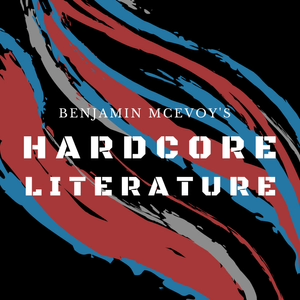
The Courage to Think – Part One
12/29/22 • 63 min
In this special, two-part episode of the Black Studies podcast, we are thrilled to be joined by David Austin and Bryan Mukandi! In part one of their incredibly generous and generative conversation, David and Bryan discuss the revolutionary power of curiosity, intellectual humility and poet-philosophers of the dispossessed such as C.L.R. James, Sylvia Wynter, Frantz Fanon, Saidiya Hartman, Ngũgĩ wa Thiong'o, Zadie Smith, Bob Marley, Linton Kwesi Johnson, and the Sons of Kemet.
David Austin is the author of Dread Poetry and Freedom: Linton Kwesi Johnson and the Unfinished Revolution and editor of Moving Against the System: The 1968 Congress of Black Writers and the Making of Global Consciousness and You Don’t Play with Revolution: The Montreal Lectures of C.L.R. James. Fear of a Black Nation: Race, Sex, and Security in Sixties Montreal is the 2014 winner of the Casa de las Americas Prize. His writing engages the work of C.L.R. James, Frantz Fanon, Sylvia Wynter, Hannah Arendt, Walter Rodney, and Linton Kwesi Johnson in relation to politics, poetry and social movements. A former youth worker and community organizer, he has also produced radio documentaries for the Canadian Broadcasting Corporation’s Ideas on C.L.R. James and Frantz Fanon. He currently teaches in the Humanities, Philosophy, and Religion Department at John Abbott College and in the McGill Institute for the Study of Canada.
Bryan Mukandi is an academic philosopher and health humanities researcher, with a background in the practice of medicine in a resource-poor, sub-Saharan African context. His work is directed towards understanding and addressing the social configurations that improve or worsen the well-being of those served least well by society. He is currently a faculty member at the University of Queensland in Australia, and one of his current research projects is Seeing the Black Child, which seeks to expand, reconfigure and present a more complex understanding of childhood than dominant conceptions of childhood in Australia that take the figure of the white child as paradigmatic.
Hosted on Acast. See acast.com/privacy for more information.
In this special, two-part episode of the Black Studies podcast, we are thrilled to be joined by David Austin and Bryan Mukandi! In part one of their incredibly generous and generative conversation, David and Bryan discuss the revolutionary power of curiosity, intellectual humility and poet-philosophers of the dispossessed such as C.L.R. James, Sylvia Wynter, Frantz Fanon, Saidiya Hartman, Ngũgĩ wa Thiong'o, Zadie Smith, Bob Marley, Linton Kwesi Johnson, and the Sons of Kemet.
David Austin is the author of Dread Poetry and Freedom: Linton Kwesi Johnson and the Unfinished Revolution and editor of Moving Against the System: The 1968 Congress of Black Writers and the Making of Global Consciousness and You Don’t Play with Revolution: The Montreal Lectures of C.L.R. James. Fear of a Black Nation: Race, Sex, and Security in Sixties Montreal is the 2014 winner of the Casa de las Americas Prize. His writing engages the work of C.L.R. James, Frantz Fanon, Sylvia Wynter, Hannah Arendt, Walter Rodney, and Linton Kwesi Johnson in relation to politics, poetry and social movements. A former youth worker and community organizer, he has also produced radio documentaries for the Canadian Broadcasting Corporation’s Ideas on C.L.R. James and Frantz Fanon. He currently teaches in the Humanities, Philosophy, and Religion Department at John Abbott College and in the McGill Institute for the Study of Canada.
Bryan Mukandi is an academic philosopher and health humanities researcher, with a background in the practice of medicine in a resource-poor, sub-Saharan African context. His work is directed towards understanding and addressing the social configurations that improve or worsen the well-being of those served least well by society. He is currently a faculty member at the University of Queensland in Australia, and one of his current research projects is Seeing the Black Child, which seeks to expand, reconfigure and present a more complex understanding of childhood than dominant conceptions of childhood in Australia that take the figure of the white child as paradigmatic.
Hosted on Acast. See acast.com/privacy for more information.
Previous Episode

Black Media Philosophy and Urban Life
In our season one finale, we are thrilled to be joined by AbdouMaliq Simone and Armond Towns to discuss urban life, media philosophy, propaganda, freedom dreams, and much more!
AbdouMaliq Simone is an urbanist with abiding commitments to Muslim working classes, abolitionist ontologies, popular economies, and ensemble work with music. For decades he has traveled across the world working with various municipalities, research groups and social movements on issues of urban transformation. He is currently a Senior Professorial Fellow at the Urban Institute, University of Sheffield and Visiting Professor of Urban Studies at the African Center for Cities, University of Cape Town. His Key publications include, For the City Yet to Come: Urban Change in Four African Cities, and The Surrounds: Urban Life Within and Beyond Capture
Armond R. Towns is an associate professor in Communication and Media Studies at Carleton University. His work brings together Black studies, cultural studies, and media philosophy, and his book, On Black Media Philosophy, was published in 2022 by the University of California Press. Dr. Towns is also the cofounder and inaugural editor of the journal, Communication and Race, the newest journal of the National Communication Association (U.S.).
Hosted on Acast. See acast.com/privacy for more information.
Next Episode

The Courage to Think– Part Two
In this special, two-part episode of the Black Studies podcast, we are thrilled to be joined by David Austin and Bryan Mukandi! In the second part of their incredibly generous and generative conversation, David and Bryan discuss some of the music, books, ideas, conversations and friendships that stimulated and sustained them during the pandemic.
David Austin is the author of Dread Poetry and Freedom: Linton Kwesi Johnson and the Unfinished Revolution and editor of Moving Against the System: The 1968 Congress of Black Writers and the Making of Global Consciousness and You Don’t Play with Revolution: The Montreal Lectures of C.L.R. James. Fear of a Black Nation: Race, Sex, and Security in Sixties Montreal is the 2014 winner of the Casa de las Americas Prize. His writing engages the work of C.L.R. James, Frantz Fanon, Sylvia Wynter, Hannah Arendt, Walter Rodney, and Linton Kwesi Johnson in relation to politics, poetry and social movements. A former youth worker and community organizer, he has also produced radio documentaries for the Canadian Broadcasting Corporation’s Ideas on C.L.R. James and Frantz Fanon. He currently teaches in the Humanities, Philosophy, and Religion Department at John Abbott College and in the McGill Institute for the Study of Canada.
Bryan Mukandi is an academic philosopher and health humanities researcher, with a background in the practice of medicine in a resource-poor, sub-Saharan African context. His work is directed towards understanding and addressing the social configurations that improve or worsen the well-being of those served least well by society. He is currently a faculty member at the University of Queensland in Australia, and one of his current research projects is Seeing the Black Child, which seeks to expand, reconfigure and present a more complex understanding of childhood than dominant conceptions of childhood in Australia that take the figure of the white child as paradigmatic.
Hosted on Acast. See acast.com/privacy for more information.
If you like this episode you’ll love
Episode Comments
Generate a badge
Get a badge for your website that links back to this episode
<a href="https://goodpods.com/podcasts/the-black-studies-podcast-212747/the-courage-to-think-part-one-27146116"> <img src="https://storage.googleapis.com/goodpods-images-bucket/badges/generic-badge-1.svg" alt="listen to the courage to think – part one on goodpods" style="width: 225px" /> </a>
Copy




